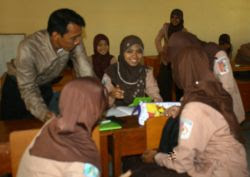| Kompetensi Dasar: | |
|---|---|
| 3.2 | Menganalisis fungsi sosial, struktur teks, dan unsur kebahasaan teks interaksi interpersonal lisan dan tulis yang melibatkan tindakan memberikan ucapan selamat bersayap (extended), dan responnya, sesuai dengan konteks penggunaannya. |
| 4.2 | Menyusun teks interaksi interpersonal lisan dan tulis sederhana yang melibatkan tindakan memberikan ucapan selamat bersayap (extended), dan responnya dengan memperhatikan fungsi sosial, struktur teks, dan unsur kebahasaan yang benar dan sesuai konteks. |
These are some examples of congratulatory expressions.
Congratulating someone on their success / achievement:
- Fantastic! Congratulations on your success!
- Your hard work and determination have paid off. Congratulations!
- Well done! What a great accomplishment! Congratulations!
- Congrats! Above and beyond. No one deserves this more.
- Kudos! No one else measures up! Congrats!
- Congratulations! You did it! Great work!
- Congrats! You totally nailed it! Great job!
- What else could I say after your remarkable achievement? Congratulations!
Congratulating someone on their birthday:
- Happy birthday! Many happy returns of the day
- Happy birthday. Wish you all the best.
- Wish you a happy birthday. Have a great time, with memories to last you throughout the whole year.
- Have a wonderful birthday! Hope your birthday is filled with fun and happiness.
Congratulating someone on their graduation:
- Congrats! You graduated!
- Congratulations on achieving such a significant milestone!
- We are so proud of you! You’ll always remember the day you graduated, and so will we. Congratulations!
Congratulations on a new born baby:
- Congrats! May your marriage be filled with more love, laughter, and memories than you ever imagined.
- Hello, Baby! You are so welcomed to the world! Congrats!
- I am so excited to hear that you're having a baby! Congratulations!
- BABY. What a precious word! So happy for you!
Congratulations on someone's wedding / engagement:
- Congrats! Happy New Home! May it be a haven of peace and a place of joy.
- Congratulations! May your love sparkle and fizz for years to come!
- Happy New Home! May the walls ring with love and laughter!
- I heard the big news that you're engaged! How wonderful!
Congratulations on someone's new job / promotion:
- Congratulations on your promotion!
- It was great to hear about your new job. Congratulations!
- Way to go! Congratulations on your new job. I knew you could do it!
- We have just heard about your promotion. You deserve it! Congrats!
Responding to congratulations:
- Thanks.
- It's nice of you to say so.
- How kind of you to say so.
A. Complete the following short dialogues
- Yani: I've just got married, Fira!
Fira: ....
Yani: .... - Aunt Mira: I heard that you got the highest score in the English final exam.
Adi: Yes, that's right, Auntie.
Aunt Mira: ....
Adi: .... - Kayla: Good news! I won the speech contest.
Dinda: ....
Kayla: .... - Mita: Thank God. I've found a job.
Rama....
Mita: .... - Ali: I just won the first prize from a quiz.
Nana: ....
Ali: .... - Angga: I've got a good mark in my Math test, Mom.
Mom: ....
Angga: .... - Sonia: Dad, I got an admission to the university.
Mr. Alex: ....
Sonia: .... - Dio: Guys, here are some cakes for us.
Rama: Woow! Is it somebody's birthday today?
Dio: Well, don't you know that it is Bayu's birthday today?
Ali: ....
Herman: ....
Tony: ....
Bayu: Thank you very much, Guys. .... - Rita: Listen, Class! I have good news. Miss Rika has been honored with the "Teacher of the Year" title. Right, Maam?
Vina: Wow! ....
Lia: ....
Miss Rika: .... - Jamal: How was your TOEIC test, Eka? Have you got the result?
Eka: Yes, thank God I got 715.
Jamal: That's .... ....
Eka: ....
B. Write a suitable and appropriate congratulation for the following situations.
- Your friend has received a scholarship to study abroad.
- Your brother has received an award for his painting.
- Your teacher has been honoured with the "Model Teacher" title.
- Your friend has got the highest grade in English National Test.
- Your friend has successfully became a finalist of a singing contest.
- https://www.greetingsisland.com/blog/50-congratulations-wishes-quotes/
- https://www.wikihow.com/Congratulate-Someone
- Picture by Clipart Library (http://clipart-library.com/humorous-congratulations-cliparts.html)











